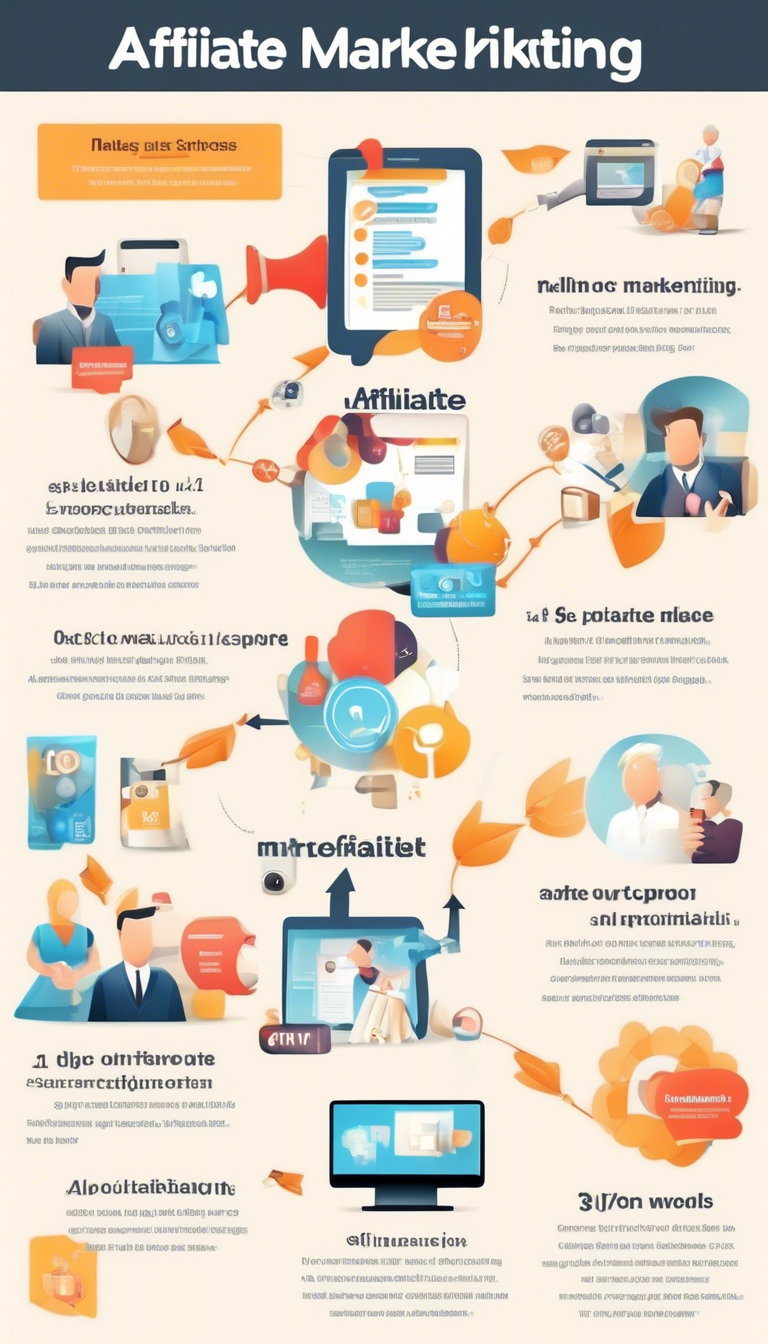Understanding Affiliate Marketing: How Does It Work and Why It Matters
Affiliate marketing serves as a powerful tool in the online business ecosystem. Essentially, it’s a performance-based marketing strategy where a business rewards external partners, known as affiliates, for driving traffic or sales through their marketing efforts. This setup creates a win-win scenario for both business owners and affiliates, making it fundamental to the digital marketplace.
Understanding how affiliate marketing works involves grasping a few key concepts:
- Affiliates: These are individuals or entities that promote a business’s products or services. They can be bloggers, social media influencers, or even a dedicated website.
- Merchants: Also known as advertisers, merchants are the businesses that offer products or services and need affiliates to help them reach a broader audience.
- Affiliate Networks: These platforms connect merchants with affiliates. They provide tracking technology, reporting tools, and often facilitate the payment process.
- Commission Structures: Affiliates earn money through various commission structures, including pay-per-sale (PPS), pay-per-click (PPC), or pay-per-lead (PPL).
The process of affiliate marketing begins when a business creates a partnership with an affiliate. The merchant provides affiliates with unique links that lead back to their website. When an affiliate shares these links on their platforms—be it a blog, YouTube channel, or social media—the stage is set for potential sales.
Once a user clicks on the affiliate link, they’re directed to the merchant’s website. If they take a desired action, such as making a purchase or signing up for a newsletter, the affiliate earns a commission. This incentivizes affiliates to effectively promote the merchant’s offerings. The tracking links ensure accurate attribution of sales or leads back to the right affiliate, which is crucial for establishing trust and transparency.
Why does affiliate marketing matter? Here are several compelling reasons:
- Cost-Effective: Many businesses pay for results, making affiliate marketing a budget-friendly approach. They only pay affiliates when a sale or lead is generated.
- Wider Reach: Affiliates often have established audiences, allowing businesses to tap into new markets. With the right affiliates, a brand can expand its visibility significantly.
- Enhanced Credibility: When affiliates, especially those with trusted reputations, promote a product or service, their endorsement builds credibility for the merchant’s brand.
- Diverse Marketing Strategies: Affiliates employ various strategies, from content marketing and email campaigns to social media promotions. This diversity fosters innovative ideas that can boost engagement and sales.
The appeal of affiliate marketing also lies in the flexibility it offers to both merchants and affiliates. Merchants can collaborate with various affiliates in different niches to create well-rounded marketing campaigns. Affiliates, on the other hand, can choose products and services that resonate with their audience, enhancing authenticity in their promotions.
For those considering entering the affiliate marketing realm, here are some strategies to ensure success:
- Choose the Right Niche: Focus on a niche that interests you and has potential profitability. This alignment can make content creation much more enjoyable.
- Build a Strong Online Presence: Create high-quality content that engages your audience. Whether through blogs, videos, or social media, producing valuable content builds trust.
- Optimize for SEO: Understand basic SEO principles to increase your content’s visibility. Good SEO practices attract more traffic to your affiliate links, increasing your chances of earning commissions.
- Engage with Your Audience: Foster a community around your content. Responding to comments and questions establishes rapport and can encourage users to click on your affiliate links.
In the fast-paced digital landscape, affiliate marketing has proven its relevance and effectiveness. Whether you’re a budding entrepreneur or an individual looking to monetize your online platform, understanding how affiliate marketing works is essential. It opens doors to numerous possibilities, driving income without the need for product creation. As the e-commerce world continues to evolve, affiliate marketing will likely remain a cornerstone of online business success.
Key Strategies for Success in Affiliate Marketing
Affiliate marketing has emerged as a powerful way for individuals and businesses to generate income online. To navigate this landscape successfully, it’s crucial to adopt effective strategies that not only enhance your performance but also promote long-term growth. Here are some key strategies to ensure your success in affiliate marketing.
Understand Your Target Audience
Knowing who your audience is plays a crucial role in shaping your marketing efforts. Conduct thorough research to identify their interests, demographics, and pain points. This tailored approach lets you create focused content that resonates deeply with them. For example:
- Conduct surveys to gather insights directly from your audience.
- Utilize analytics tools to understand user behavior and preferences.
- Engage with your audience on social media to gain real-time feedback.
Choose the Right Affiliate Programs
Not all affiliate programs are created equal. Selecting the right one can significantly impact your earning potential. Consider the following factors:
- Reputation: Partner with brands that have a positive reputation. This builds trust with your audience.
- Commission Structure: Analyze the commission rates and payout structures. Higher commissions can lead to better returns.
- Product Fit: Ensure the products or services align well with your audience’s interests.
Create Quality Content
Your content is the backbone of your affiliate marketing strategy. High-quality, engaging content not only attracts visitors but encourages them to click through your affiliate links. Here are some tips for creating compelling content:
- Be Authentic: Share your personal experiences with products. Authenticity boosts credibility.
- Provide Value: Focus on solving problems and offering practical solutions while integrating affiliate links seamlessly.
- Use Various Formats: Consider using blogs, videos, and podcasts to diversify your content reach.
Optimize for Search Engines
Search engine optimization (SEO) is essential in making your content visible to a broader audience. Implementing effective SEO strategies will help you rank higher on search engine results pages. Here’s what you can do:
- Keyword Research: Identify relevant keywords with high search volume and low competition.
- On-Page SEO: Optimize title tags, meta descriptions, and headers. Ensure your focus keyword appears naturally in the content.
- Build Backlinks: Connect with other sites to generate backlinks, boosting your credibility and rankings.
Utilize Social Media Effectively
Social media platforms are an excellent way to promote your affiliate products. They help you reach a larger audience while allowing for direct engagement. Here are some strategies to apply:
- Platform Selection: Choose platforms where your target audience is most active, be it Facebook, Instagram, or LinkedIn.
- Engage Regularly: Regular engagement with your audience fosters loyalty and increases sharing potential.
- Ad Campaigns: Invest in paid advertising to boost your content’s visibility and reach a specific demographic.
Track Performance and Adjust Strategies
Monitoring your performance is critical for identifying what works and what needs improvement. Use analytical tools to track metrics such as clicks, conversions, and overall traffic. This data will offer insights into your strategies’ effectiveness and highlight areas for enhancement.
Maintain Transparency with Your Audience
Honesty fosters trust. Always disclose your affiliate relationships to your audience. Transparency about your affiliations can enhance credibility, encouraging readers to support you by clicking on your affiliate links. Remember, a trustworthy approach can lead to higher conversions.
Ultimately, successful affiliate marketing requires dedication, strategic planning, and continuous learning. By understanding your audience, producing quality content, and maintaining a transparent relationship with your followers, you set the foundation for a thriving affiliate business. Adopt these strategies to enhance your effectiveness and maximize your earnings.
Conclusion
Affiliate marketing represents a compelling opportunity for both new and seasoned marketers to generate revenue online. As we’ve explored what affiliate marketing is and how it works, it’s clear that understanding the fundamentals—like the roles of affiliates, merchants, and consumers—is necessary for anyone looking to dive into this dynamic industry. Understanding the mechanics behind affiliate marketing is not just about knowing the terms; it’s about grasping the very essence of what makes this model thrive. By comprehending the interconnected roles that each participant plays, marketers can create more effective strategies that resonate with their audience.
One essential aspect that stands out is the importance of building trust, which we touched on throughout our discussion. Successful affiliate marketing hinges on the ability to foster genuine connections with potential customers. When affiliates promote products, they do so not just with the intent to earn commissions, but to provide value, solve problems, and meet needs for their audience. When you genuinely care about the products you promote and communicate that authenticity in your messaging, your audience is more likely to engage with your content and make purchases based on your recommendations.
Moreover, adopting key strategies for success in affiliate marketing has proven to be game-changing. Whether it’s leveraging the right platforms for promotion or utilizing organic SEO methods to enhance visibility, success doesn’t come without a comprehensive approach. Content marketing is undeniably a significant player here; producing high-quality, informative content allows affiliates to position themselves as thought leaders in their niche. This not only attracts a loyal following but also improves conversion rates. Remember, users are more inclined to follow an affiliate who demonstrates expertise and authority in their field.
Networking and relationship-building are foundational strategies that often don’t receive enough attention. Building relationships with other affiliates, brands, and platforms can open doors to collaboration, joint ventures, and exclusive deals that can set you apart in the crowded affiliate landscape. Engaging with fellow content creators or influencers can amplify your reach, bringing in a wave of new audiences devoted to niche interests.
As we addressed earlier, data analysis and performance tracking are crucial strategies that cannot be overlooked. Keep tabs on which affiliate links convert best to identify what works for your audience. By understanding key performance indicators (KPIs), you can refine your strategies, making informed adjustments to optimize your marketing efforts. This proactive approach not only sustains your current relationships and performance but also propels your business growth over time.
In the evolving landscape of digital marketing, competition has become fiercer, with countless affiliates vying for the attention of the same audiences. Thus, differentiating yourself becomes an undeniably critical strategy. Being unique and creative in the way you present your affiliate products can resonate more with consumers. Embracing storytelling can help convey the utility and benefits of the products you promote in a way that simply listing features cannot achieve.
Additionally, optimizing the user experience on your blog or website cannot be overstated. Slow-loading pages or clunky layouts can drive potential customers away, resulting in lost sales. Investing in a seamless, visually appealing user interface can greatly enhance user engagement and ultimately improve conversion rates. It’s the little details that collectively make a significant impact, ensuring your audience feels comfortable as they navigate through your content.
As this landscape continues to shift with changing consumer behaviors, technologies, and platforms, keeping a learner’s mindset is imperative. Embrace continuous learning by staying updated on the latest trends, tools, and best practices in affiliate marketing. Whenever possible, join forums, webinars, or workshops to interact with fellow marketers and discuss strategies that yield results.
Navigating the realm of affiliate marketing is not without challenges, but it is certainly achievable with the right mindset, strategies, and dedication to ongoing improvement. By understanding how affiliate marketing works and implementing the right practices, you can build a sustainable income stream while providing genuine value to your audience. The road may have its ups and downs, but the potential for reward makes affiliate marketing a venture worth pursuing. Remember, it’s not just about making quick commissions; it’s about creating lasting relationships, delivering value, and growing alongside your audience. The journey is as important as the destination, so take the time to refine your approach and enjoy the process as you build your affiliate marketing empire.


